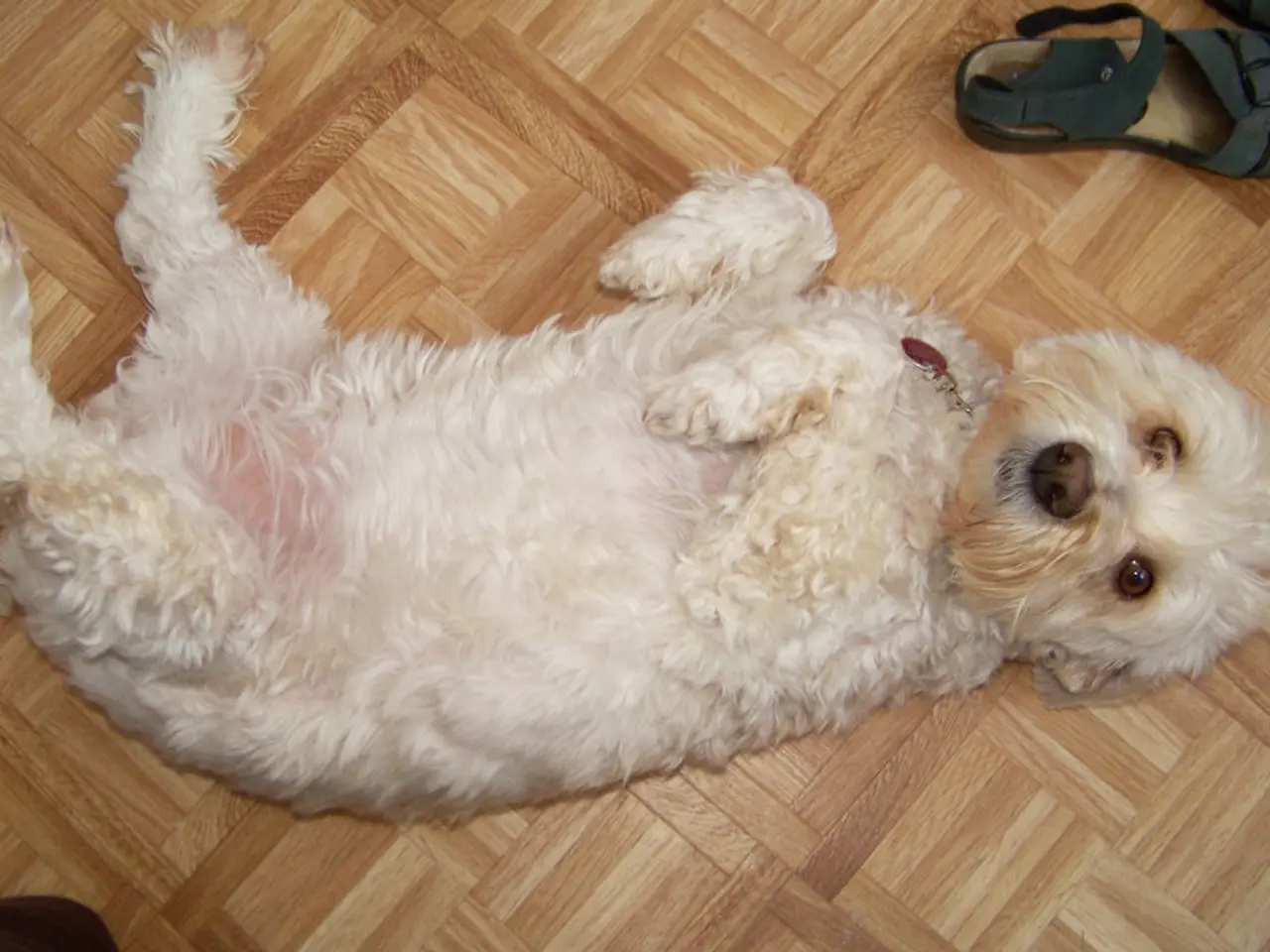Reasons Behind a Dog Licking Its Paws and Solutions Provided
Dogs, much like humans, have their own ways of showing discomfort or distress. One such behaviour is excessive paw licking, which can be a sign of various underlying health issues or behavioural problems.
Excessive paw licking in dogs is commonly caused by allergies, infections (bacterial or fungal), injuries, parasites, skin conditions, or anxiety. It's essential to address this behaviour promptly to ensure effective treatment and to improve the dog's comfort.
Allergies, whether to pollen, dust mites, mold, food, or chemicals, can cause itching, redness, and inflammation. Dogs lick to soothe these symptoms. Treatment may involve allergy testing, medicated shampoos, antihistamines, or dietary changes.
Infections like yeast or bacterial infections can cause redness, odor, discharge, or sores. Licking worsens these by spreading infection. Vet-prescribed antibiotics or antifungal medications and topical treatments are necessary.
Injuries or irritations, such as cuts, cracks, thorns, or joint pain, lead dogs to lick an affected paw for relief. Cleaning wounds with pet-safe solutions and preventing licking (e.g., with a cone) supports healing. Severe wounds require veterinary care.
Parasites, like mites or fleas, cause itching and irritation. Treatment includes parasite control medications and sometimes medicated baths.
Skin conditions such as dermatitis or autoimmune diseases can cause inflammation and itching that leads to licking. Diagnosis may require skin scrapings or lab tests; treatment varies by condition.
Anxiety or stress can trigger compulsive licking as a coping behaviour. Behavioral modification, environmental enrichment, and calming aids may help reduce this habit.
If a dog’s paw licking is persistent, causes redness, swelling, sores, or targets one paw, a veterinarian should evaluate the dog to identify the cause and recommend appropriate treatment. It's best to seek veterinary treatment rather than using over-the-counter remedies.
Remember, it's not advisable to actively encourage a dog to lick their feet, and distraction is a better approach. Using a buster or Elizabethan collar can help temporarily prevent a dog from licking their paws if they are causing trauma.
In conclusion, understanding the root cause of excessive paw licking in dogs is crucial for providing the appropriate treatment. If you notice your dog licking their paws excessively, consult a veterinarian for a thorough examination and advice tailored to your pet's needs.
- Dogs, like humans, might present behavioral signs of discomfort, such as excessive paw licking, which could indicate underlying medical-conditions like allergies, infections, injuries, parasites, or skin conditions.
- Allergies can lead to itchiness, redness, and inflammation, prompting dogs to lick affected areas, and potential treatments may involve allergy testing, medicated shampoos, antihistamines, or dietary changes.
- Infections, such as yeast or bacterial infections, can cause paw redness, odor, discharge, or sores, aggravated by excessive licking, and proper treatment includes vet-prescribed antibiotics or antifungal medications, as well as topical treatments.
- Injuries or irritations, like cuts, cracks, thorns, or joint pain, can lead dogs to lick their paws for relief, and it's beneficial to clean wounds with pet-safe solutions, prevent licking with a cone, and seek veterinary care for severe wounds.
- Parasites, such as mites or fleas, can cause itching and irritation, leading dogs to lick their paws, and treatment entails parasite control medications and sometimes medicated baths.
- Skin conditions like dermatitis or autoimmune diseases can cause inflammation, itching, and subsequently excessive paw licking; diagnosis may require skin scrapings or lab tests, while treatment varies by condition.
In addition, anxiety or stress could trigger compulsive licking as a coping mechanism, and behavioral modification, environmental enrichment, and calming aids might help alleviate this behavior. If a dog's paw licking is persistent, causes redness, swelling, sores, or targets one paw, it's advisable to consult a veterinarian for evaluation, and to seek professional advice for tailored treatment solutions. Lastly, it's best to avoid actively encouraging a dog to lick their feet, and distraction is recommended over punishment. Using buster or Elizabethan collars can help temporarily prevent a dog from licking their paws if they are causing trauma.




